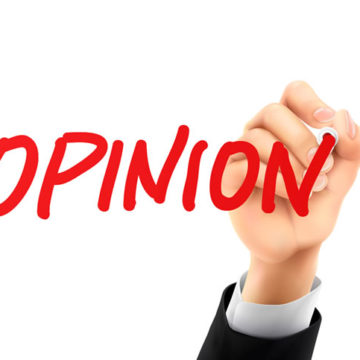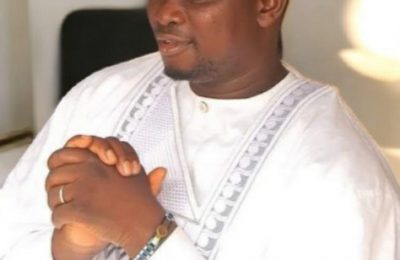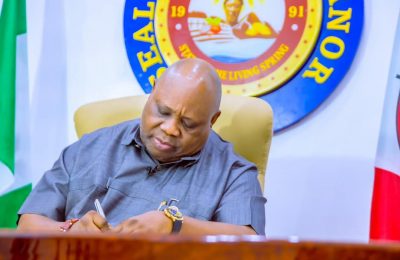

THE essence of any government is to better and improve the welfare of the citizens. Any developmental project, whether physical or social, aims to improve the lives of a lot of the masses. Any governmental project that does not make the lives of the citizens better has derailed from the essence of governance. The key variables in this article are economic development and governance. These two variables will score perhaps the highest among the factors causing both social and political instability in Nigeria today. The myriads of problems hindering economic development in Nigeria include problems of urban overpopulation, poor infrastructure in terms of roads and power, rural stagnation, massive unemployment and underemployment, and growing inequalities in income and wealth; the middle class has been wiped out. The policies of the current administration have created an impoverished millions of citizens. In many parts of Nigeria today, we face the war of poverty and hunger as a result of the inflationary trends. The naira has been bastardised as a result of the policy of floating the naira. No country bastardises her currency and remains strong.
Nigerians have lost complete confidence and faith in the naira. Yet a national currency is the greatest emblem of a nation’s integrity and honour. Few nations in the world can bastardise their currencies in this manner and remain economically strong. Any such nation will go from poverty to poverty, from debt to debt, from hunger and deprivation to greater hunger and greater deprivation, which we as citizens are currently going through”. Under this prevailing condition, I doubt very much if we can achieve economic development. At this juncture, one may ask what is economic development. Economic development involves the transformation of an underdeveloped economy into a modern industrialised economy. It is the process whereby the real per capital income of a country increased over a long period of time. Therefore, economic development involves both quantitative and qualitative increase of production and distribution. A number of theories of economic development exist and it is impossible to appraise all of them in a brief article like this. However, attempt is made to make a skeletal review of those appropriate to this article.

Joseph Schumpeter presented the basic ideas of economic growth in his theory of economic development, he argued that real development is achieved through internal activities rather than from external influences. This is where governance comes in; the government should provide an atmosphere where the masses participate in the process of development. Can the entire citizen be involved in the process of development when their welfare is not properly attended to? This theory further stresses the role of entrepreneur in the development process. As we all know the entrepreneur is the man who sees the opportunity for utilising a new technique or a new commodity. He is the man to coordinate all the factors of production for the benefits of individuals and the entire economy. The role of the entrepreneur is crucial in the development of a nation, because he is assigned the basic role of the innovator in the economic system. He sees and calculates what uses the society wants to make of its scarce resources, and organizes the resources to serve these uses. The entrepreneur is the intermediary between the forces of demand and supply. To what extent has governance assisted in developing local entrepreneur? In 1972, the Nigeria Enterprises Promoter Decree (Decree No. 4) attempted to develop a pool of indigenous entrepreneurs. Certain businesses were to be run and managed by Nigerians, and some were to operate under joint ventures. There were enterprises exclusively reserved for Nigerians and some partially barred to aliens – foreigners.
To some extent, these policies have helped many Nigerian entrepreneurs emerge in economic scenes. However, this decree has been modified several times. We cannot overemphasize the importance of indigenous entrepreneur, because the industrial achievement of countries such as Taiwan, South Korea, Singapore and Hong Kong were attributed to the roles of private enterprises. However, the development of private entrepreneur may be hampered by corruption and other systemic factors. A situation where a person can suddenly become a multi-millionaire overnight without sweating for it does not create a conducive atmosphere for the rise of entrepreneur. Nowadays, people make cheap money through contracts, not through their vision and ability. All of this boils down to the problem of governance. We may ask, can development take place without good governance? There is no doubt that good governance constitutes one of the key factors to rapid and sustainable economic development. The two issues, governances and economic development as stated earlier on in this article will score perhaps the highest among the factors causing economic problem in Nigeria toady.
Governance has been variously defined and conceptualized. According to the Oxford Dictionary, governance is defined simply as an act of governing’. However, there is a school of thought which perceives governance in a new light arising from a new shift in theory. Governance is seen to have two faces, each with specific functions. The first face contains the rulers or leadership whose responsibilities are derived from the principle of effective governmental organisations. The second face contains the citizens, whose responsibilities are to participate in the socioeconomic and political affairs of the society. These two groups, the leaders and the citizens, are not equal in terms of power and authority. In Nigeria, for instance, there is a wide gap between the rulers and the ruled. While the leaders are amassing wealth the citizens are living in abject poverty. This is a hindrance to economic development. An effective governmental organisation that can generate meaningful development must exhibit the following characteristics, efficiency, acceptability, transparency, and responsibilities to the public yearnings and aspirations. Applying all the variables to the governance we have in Nigeria today and governance we had since independence, one would conclude that we have never had a good governance that can generate meaningful development.
How far has governance developed strong institutions to promote efficiency and transparency? How effective in Nigeria are the Independent Corrupt Practice and other Related Offences Commission (ICPC) and Economic and Financial Crimes Commission (EFCC) designed to curb corruption? Many cases have been on for years without any feasible solution. When one relates governance to economic development one will see clearly that governance in Nigeria has not produced enough big push to generate meaningful development. It is argued that governance becomes problematic when it does not involve the citizens and when it becomes unaccountable and uncaring for the welfare of the people. Policies should be made to generate economic development which grows the economy of the country and improve the welfare and wellbeing of the citizens. Policies that create hardship for the majority of the citizens need fine-turning. Efforts should be made to minimize the economic hardship faced by citizens on daily basis. It is high time we stopped listening to Bretton Woods Institutions such as the World Bard and the International Monetary Fund (IMF), established to promote the growth of Western economies. Most of the economic policies introduced to developing countries created more problems by increasing poverty in those countries. What did Nigeria achieve from structural adjustment programs? To achieve meaningful and sustainable economic development, governance should strive to develop homegrown economic solutions.
Dr. O. A. Lawal is an economist and author.
READ ALSO: Bayelsa, good governance and Dickson’s leadership








